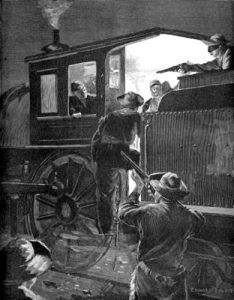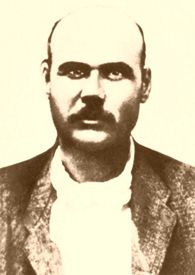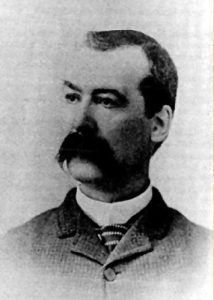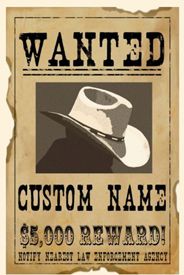By James Harvey McClintock in 1913
For a while, train robbery was popular in Arizona, despite a statute passed, though never enforced, making the crime punishable by death. One of the most daring train robberies occurred at about midnight on September 9, 1899. Express Messenger Charles Adair, who had killed an overly adventurous train robber on the same run the year before, stepped to the door as a westbound Southern Pacific Express train reached the small station of Cochise. As he looked out, it was into the muzzle of a revolver, and he and the train crew were soon lined on the platform with their hands in the air. The express car was detached and ran a couple of miles westward. The messenger was known to be ignorant of the safe combination, so the safe was opened with dynamite. The loot was rich, comprising a bag full of gold and currency valued at least $10,000.
The four men involved fled into the Chiricahua Mountains, unsuccessfully followed by posses headed by Sheriff Scott White and George Scarborough.
The truth concerning the Cochise robbery came out a few months later, on February 21, 1900, following a supplemental train robbery, that of the express car of a Benson-Nogales train held up at Fairbank. The hero of the affair was Express Messenger Jeff D. Milton, who fought until incapacitated by a bullet wound that terribly shattered an arm. The wounded messenger, who was given the highest praise for the defense of his trust in previous days, had been a cattle association detective, a customs inspector, and chief of police at El Paso, Texas. The bandits numbered five. One of them was captured six miles from Tombstone the next morning, where he had fallen from his horse and was abandoned by his companions. He was Jack Dunlap, alias Three-Fingered Jack, a well-known cowboy horse thief. He died a few days later in the Tombstone hospital, having received a buckshot load from Milton’s shotgun.
In a pass of the Dragoon Mountains, Sheriff Scott White captured three of the others, who proved to be the leader, Bob Burns and John and Lewis Owens. With them was the booty, which consisted of only 17 Mexican pesos. The robbers expected the Fort Huachuca payroll to be in the express car safe. Soon afterward, the score was made complete by the arrest at Cananea of Tom Yoes, alias “Bravo John,” who had been shot in the leg.
Before Jack Dunlap died, he gave the officers the first information concerning the Cochise robbery, implicating Burt Alvord, Constable at Wilcox, and William Downing, a well-to-do cattleman. There was some humor in the situation because Alvord had been one of the noisiest and most active pursuers of the train robbers.
Later, William L. Stiles, Deputy Constable at Pearce, confessed the details of the whole affair. He and another cowboy, Matt Burts, did the work alone, but the job was planned, and supplies for it were furnished by Alvord and Downing.
Alvord had provided the dynamite, secured by breaking into a Wilcox powder house. Immediately after the job was done, the spoil was taken to Alvord and Downing at Wilcox for division. Stiles received only $480 for his share, and his dissatisfaction is said to have been the reason for his confession. It is evident, however, that Stiles suffered from remorse, though not for his crimes.
Considered merely a witness for the Government, Stiles was allowed some liberty. He repaid their confidence in April 1900 by entering the Tombstone jail and, after shooting the jailer through the leg, releasing Alvord and “Bravo John.”
Downing refused to leave, and Burts, who had been arrested in Wyoming, happened to be outside with a deputy sheriff at the time. So the trio hung upon them all the weapons they could find in the sheriff’s office and took to the hills on stolen horses.
They were next heard of at Alvord’s ranch near Wilcox, where they made an announcement that they proposed to rob a few more Southern Pacific trains. When the Tombstone Prospector criticized the sheriff’s office in connection with the escape, the sheriff’s brother replied by hammering Editor Hattich over the head with a revolver. In addition to various rewards offered by the sheriff and territorial authorities, W.C. Greene offered $10,000 for capturing the two outlaws, who were understood to have disliked Greene immensely.
Alvord surrendered in 1902, tired of the free life of a roving bandit, and expressed himself well pleased at being back where he would be sure of three square meals a day. He had been in the bandit business three years since he laid the plans for the train robbery at Cochise. He had spent most of the intervening time in Sonora, where Captain Burton Mossman of the Arizona Rangers followed and secured expression of a wish to return to the United States if assured of reasonable clemency. But it was to his old friend, Sheriff Del Lewis, that the surrender was made on the border near Naco. Alvord’s way was made easier by the fact that he had assisted in the capture of Chacon, a notorious Mexican murderer. At Tombstone, he was discharged from custody, owing to the events of the territorial statute that provided death as the only penalty on conviction of train robbery. Still, he was rearrested and taken to Tucson on the charge of interfering with the United States mail.
Alvord and Billy Stiles came into the limelight again in December 1903 when they dug out of the Tombstone jail and escaped for the second time. A week before, Alvord had been convicted of robbery of the mail. He had been held at Tombstone merely as a witness in the case against Stiles.
Alvord was later taken at Naco but had only two years’ imprisonment, managing to evade arrest on other charges at the time of liberation at Yuma. He is said to have made his way to Panama, where he bossed Spanish-speaking laborers for a while before departing for Argentina.
When William Downing was tried on a charge of train robbery, he was acquitted for the reason that conviction would have meant hanging, but on another charge, he served a seven-year term. Downing was happily removed from necessity and used bad judgment to defy Territorial Ranger Spee after terrorizing Wilcox for months. After his death, it was learned that he had been a member of the notorious Sam Bass Gang of Texas and had been driven out of that state by Texas Rangers. In Arizona, he had served two penitentiary sentences, one for train robbery and one for shooting Robert Warren. Burts went to Yuma for a term and was followed by Stiles, who surrendered in the summer of 1900. The latter was reported killed in December 1908 while working in Nevada, where he was known under the name of Larkin. The killing was said to have been an assassination, the man shot in the back while leading a horse.
Written by James Harvey McClintock in 1913, compiled and edited by Kathy Alexander/Legends of America, updated April 2024.
Notes and Author: James Harvey McClintock was born in Sacramento in 1864 and moved to Arizona at the age of 15, working for his brother at the Salt River Herald (later known as the Arizona Republic). When McClintock was 22, he attended the Territorial Normal School in Tempe, earning a teaching certificate. Later, he served as Theodore Roosevelt’s right-hand man in the Rough Riders during the Spanish-American War and became an Arizona State Representative. Between the years 1913 and 1916, McClintock published a three-volume history of Arizona called Arizona: The Youngest State (now in the public domain), in which this article appeared. McClintock continued to live in Arizona until his poor health forced him to return to California, where he died on May 10, 1934, at the age of 70.
Note: The article is not verbatim, as spelling errors and minor grammatical changes have been made.




